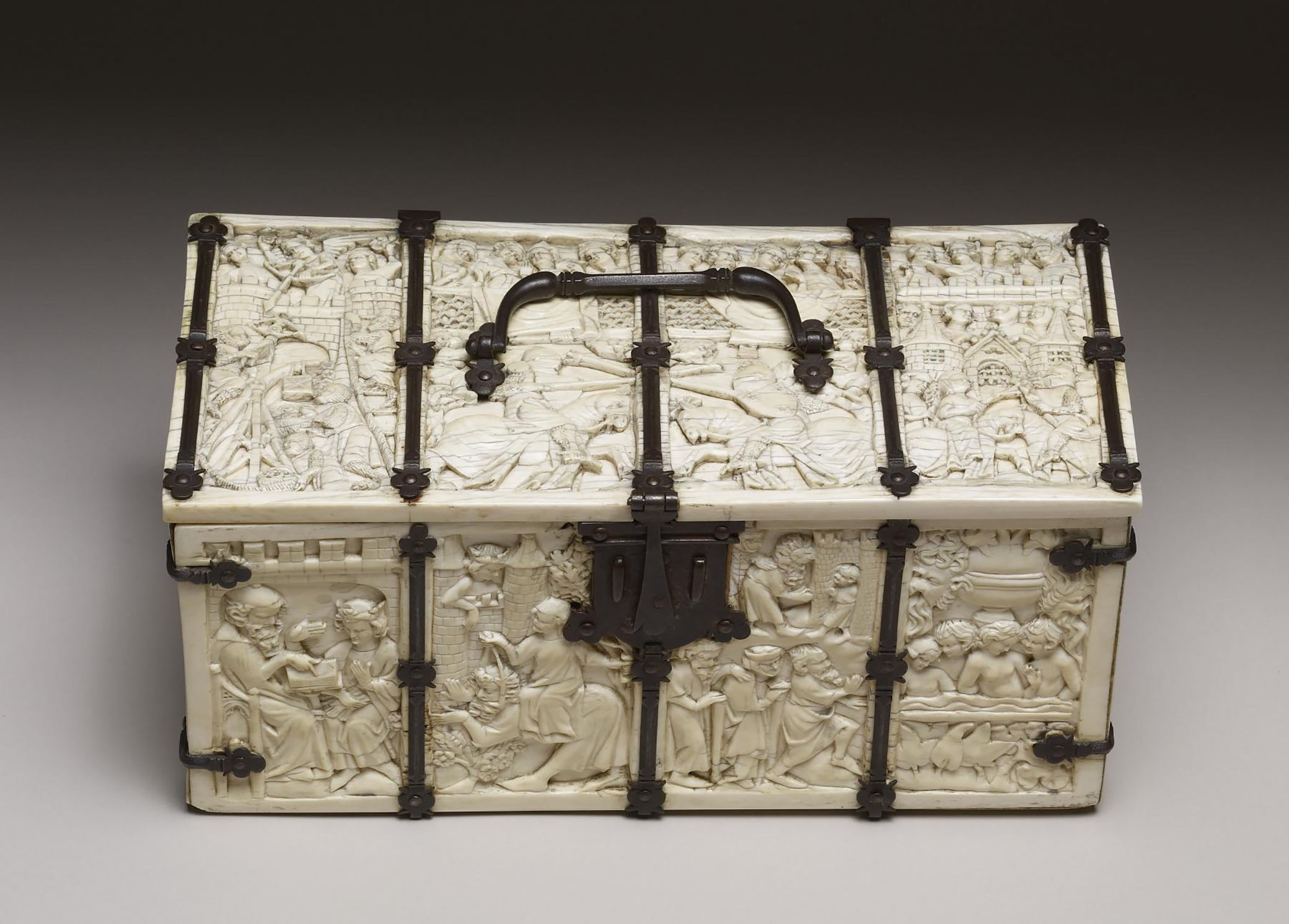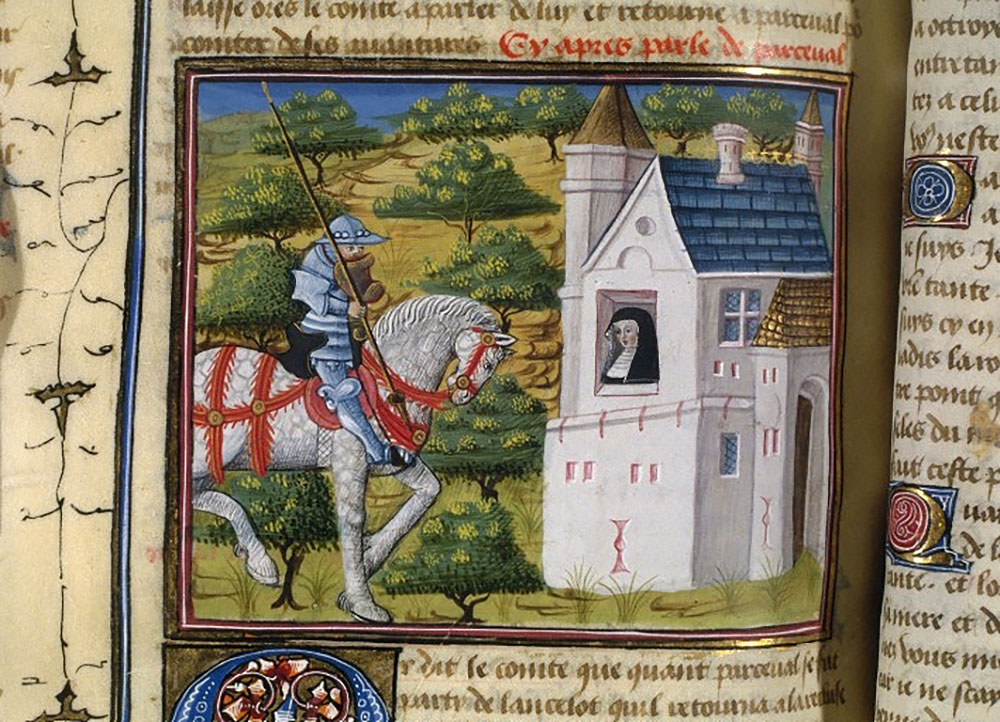
Casket with scenes of romances, France, fourteenth century. The Walters Art Museum.
When the London newspaper the Athenian Mercury, edited and published by the author and bookseller John Dunton, first answered questions about romance, bodily functions, and the mysteries of the universe in 1691, it may have created the template for the advice column. But the history of advice stretches back even further into the past. Advice—whether unsolicited, unwarranted, or desperately sought—appears in ancient philosophical treatises, medieval medical manuals, and countless books. Lapham’s Quarterly is exploring advice through the ages and into modern times in a series of readings and essays.
In 1178, when Louis VII ordered the coronation of his teenage son Philip-Augustus, the poet Chrétien de Troyes is believed to have come under the patronage of the young prince’s godfather, Count Philip of Flanders. He was already well-known at the time for his retelling of the story of Lancelot and Guinevere. Chrétien was one of the first poets to center his verse romances around individuals within Arthur’s court, rather than the king himself, usually adapting and rewriting traditional Celtic stories concerning marriage, love, and social obligations.
Perceval, Chrétien’s final work, is supposed to have been inspired by Philip, who gifted Chrétien a copy of a book containing a “story of the grail” that he believed was useful for entertaining court audiences and asked him to adapt it for verse. Chrétien began Perceval with a prologue praising his patron’s many virtues over Alexander the Great; it was incomplete when he died, and four authors wrote continuations.
Chrétien’s story follows Perceval, by some accounts a foolish young noble and by others a foolish commoner, who lives with his widowed mother and aspires to become a knight in King Arthur’s court. Once his dream is realized, Perceval gets into fights with the king’s administrator and promptly kills an enemy with a javelin. Afterward he encounters an older knight who counsels him on the importance of chivalry and reticence.
Dear brother, keep in mind
That if yourself you should find
In combat with another knight,
I say, and pray of you, outright:
That if you have the upper hand,
Such that he can no longer stand
Against you, not even to defend,
But rather begs to make an end,
Cries “Mercy!” then kill him not.
And may these words not be forgot:
Talk not too much, nor too freely,
For none can speak for long ere he
Says something oft, along the way,
That smacks of villainy. They say,
The wise, to themselves within:
“Who speaks too much commits a sin.”
So I, dear brother, forbid you to
Talk too much, and I beg of you,
If some girl or woman you find,
Or a maiden or a lady, mind,
Who seems in any way distressed,
Counsel her, aid her, do your best,
If you can pluck counsel’s flower,
And to do so is in your power.
Around the time of Perceval’s publication, pamphlets and manuscripts containing advice about Christian ethics and good behavior began to spread in courts and among royal and aristocratic families. Chrétien incorporates lessons from various teachers into the dialogue of Perceval’s story; a little over a century later, the poet Robert de Blois adopted the same tradition with his Beaudous, an Arthurian romance that begins, like Perceval, with the eponymous hero receiving wisdom from his mother before he begins his journey to Arthur’s court. In Perceval’s case, the reminders about good behavior are soon ignored.

“Bring food,” Perceval cried,
“I know not what your words implied,
But many do go, and willingly,
To this king who, from chivalry
Makes knights; I too shall go to court.”
His mother then, although she sought
To keep him there, and have him stay,
Clothed and equipped him for the way,
Gave him a large coarse hempen shirt,
And those breeches in which are girt
Those Welshmen, where, it seems to me,
Breeches and hose are one, entirely;
And a deerskin tunic, a close fit,
And a deerskin hood to go with it.
Thus was he clothed by his mother.
Three days, he stayed, not another,
For now he would brook no delay.
Then his mother, full of dismay,
Kissed and embraced him, in tears,
Saying: “How sad I am, my dear,
To see you go. To the royal court
Go then, and say that you sought
Him so he might grant arms to you.
I know that he would not refuse,
But would grant them you, indeed.
Yet when it comes to any deed
Of arms, how will you fare, son?
That which you have never done,
Nor hath any man shown it you;
How will you know what to do?
Ill will you do, I cannot doubt.
Ill will fare, and be put to rout.
No wonder to me, if thus you fought;
None can do what they’ve not been taught.
Yet failing to learn what’s seen and heard,
Oft and again, proves more absurd.
Dear son, I have a lesson to teach;
So pay attention to what I preach,
And if you should my lesson retain,
Then great advantage you may gain.
Son, you will shortly be a knight,
If God so please; praise Him aright!
If you should find, or far or near,
A lady who seeks your aid, my dear,
Or a fair maiden in distress,
Who, needing aid, doth you address,
Then, should it be of her seeking,
Much honor to you it will bring.
For he who honors not woman,
Must be, in honor, but a dead man.
Maiden and lady you should serve,
If you’d be honored as you deserve.
And if you should wish her favor,
Take care not to rouse her anger.
Do you nothing that may displease.
Who kisses a maid has won his fee;
If she deigns to grant you a kiss,
Then assume no more than this,
For my sake, seek not to linger.
But if she’s a ring on her finger,
Or a purse for alms at her waist,
And through love, or of her grace,
She gives it you, tis well with me,
And you may wear the ring freely;
I give you leave to take the ring;
And the purse? Accept the thing.
Dear son, I say, twill prove a sin,
If in your lodgings, or at an inn,
You meet a man, befriend the same,
Without your asking for his name.
Fit name to person, if you can,
For by the name we know the man.
Dear son, speak you with gentlemen,
And go walk with them, and often;
A gentleman ne’er leads astray
Those who meet him on the way.
Above all else, I pray you well,
Attend at church, and go to chapel,
And pray you there to Our Lord,
That joy and honor He afford
You and, if you so continue,
To a good end will bring you.”
“What is a church, dear mother?”
“A place where we come together
To serve Him, who heaven and earth
Made, of whom all creatures had birth.”
“And a chapel?” “That is the same,
A fine and saintly house, I name,
Filled with relics, treasures holy,
Wherein they offer up the body
Of Jesus Christ, the holy prophet,
Who, shamefully, betrayal met;
He was traduced, judged wrongfully,
And suffered mortal agony;
Died for man and woman so,
Whose souls into Hell did go,
Once they all had quit the body,
Those whom He from Hell set free.
Bound to a pillar, he was beaten,
Upon the Cross suspended then,
His head bore a crown of thorns.
So, to hear the Mass each morn,
And the Lord Christ to adore,
Attend church, as I said before.”
“Then I shall go, most willingly,
To church and to chapel, daily,”
Said the youth, “from now on.
If tis my duty.” He’d be gone;
He would, now, no longer stay,
Takes his leave, to go his way,
Saddling his horse. She cries.
In the manner and the guise
Of a Welshman is he dressed,
Boots of hide, his very best.
But though every place he goes
He takes his three spears, and so
Would carry them along today,
His mother steals two spears away,
Since such seem too coarse to her;
And then, she would have him err
And leave all three, if she could.
His right hand held a whip, one good
For urging his fine steed along.
His mother cried that he was gone,
Done kissing him whom she adored,
Now praying for him to the Lord.
Read the other entries in this series: Inez Milholland and Eugen Boissevain, George Washington, Plutarch, Lewis Carroll, Yan Zhitui, Nizam al-Mulk, Saadi, Giovanni Della Casa, Maria Edgeworth, Dan McQuade on basketball manuals, and Leopold Froehlich on syndicated advice columnists.